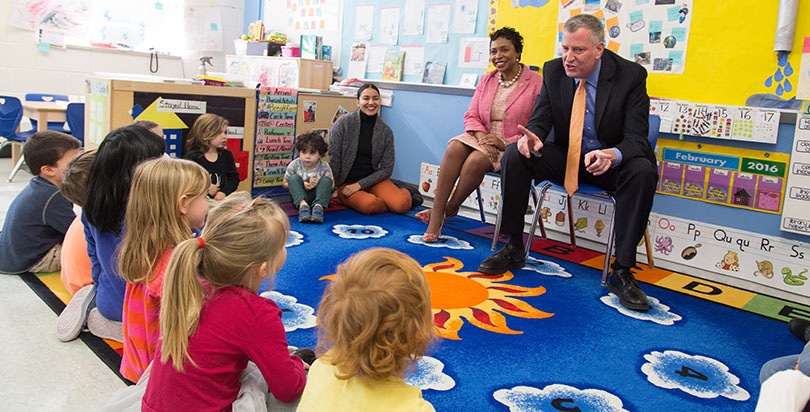Analysis: The Fierce Fight Over Mayoral Control Reflects De Blasio’s Weakness on Education

Bill de Blasio owns the public school struggle of New York City — for now, and to the limited extent any one person can. He hasn’t been bashful, creating a vast, vastly popular universal preschool program; negotiating the first new teachers contract in years; directing unprecedented amounts of funding to low-performing schools; reducing suspensions; and making long-term investments in literacy, algebra, computer science, college access, and more.
Top-line data suggest he may be succeeding. State tests continue to be tweaked and can’t yield reliable inferences, but the city’s rising scores are still preferable to falling ones. Four-year graduation rates also continue to climb, hitting a new high of 72.6 percent in 2016, while dropout rates have fallen by about a point over two years, to 8.5 percent. (Both measures have improved considerably since at least 2005, when the four-year graduation rate was a dismal 46.5 percent and 22 percent of students dropped out.)
The improved graduation rate has been driven by the city’s strongest schools, and college readiness still lags citywide — 50.7 percent of graduates are prepared, according to the Department of Education. But the incongruity isn’t de Blasio’s fault: While nearly 80 percent of graduates who attend the city’s community colleges require remediation, that figure has been steady for 15 years, according to a study by the city comptroller — despite the 36-point rise in the four-year graduation rate over that time.
Press releases tell the rest of the de Blasio story: more than 200 needy schools adding wraparound services through the Community School initiative; a big expansion of after-school opportunities for middle schoolers; more students taking AP tests; young people from poor areas benefiting from mentors known as Single Shepherds (a name suitable for a rural Welsh dating service); more teacher preparation and time set aside for parents; a promise to build 38,000 seats to relieve school overcrowding.
It’s an accomplished résumé, especially after just three and a half years. Yet one of the most striking features of New York City’s public life in 2017 is how little enthusiasm or even familiarity it commands apart from pre-K. The animosity of Senate Republicans and de Blasio’s refusal to embrace charter schools may have made the recent confrontation over mayoral control inevitable, but de Blasio, late-arriving, press-denigrating, Park-Slope-Y-using, has unnecessarily made his job harder in education both as a matter of policy and of public opinion.
The result? When Senate Republicans turned to the question of renewing the Democratic mayor’s control of New York City schools, with the Assembly waiting and watching in the shrubbery, supporters cited the need for mayoral control rather than the merits of this mayor’s control. His record was never a serious selling point.
“I don’t get the sense there’s a big constituency that thinks he’s doing great,” said Dan Weisberg, CEO of the education advocacy group TNTP and the Department of Education’s head of labor relations under Mayor Michael Bloomberg. “If you’re being objective about it, there’s not a huge groundswell for change.”
Contrary to his reputation as being slow to act, de Blasio left his January 2014 inauguration ceremony in a sprint. He mobilized a massive organizing effort to open and fill pre-K centers in underserved neighborhoods, ultimately more than tripling the enrollment of 4-year-olds and winning almost universal acclaim. (Some academics believed the program especially benefited more affluent children — who can afford to pay and who need preschool less — but a widely quoted critic has softened his view.)
Politically, de Blasio and his team may have been too efficient. His plan was already in place before the end of his first month; by April 2014, three months later, his office had issued 10 press releases related to the initiative; from 2015 to 2017 it has released a total of nine preschool announcements. By the start of the school year in September 2014, more than 50,000 children had enrolled.
The administration would never be as successful again. Unlike test scores or graduation rate gains, unlike school construction projects and safety metrics, the Pre-K for All success wasn’t repeatable (although the administration is hoping to do just that with its new 3K program for 3-year-olds). Preschools don’t yield the hard, annual data markers that reputations and public support are built on. The measurable impact of the program likely won’t reveal itself to researchers until this mayor is no longer in office.
The “Equity and Excellence” reform agenda that followed a year later, in September 2015, was saluted for its ambitious scope and criticized for similar reasons. De Blasio described eight “critical” new programs — including literacy, algebra, and computer science — that had a willy-nilly, see-what-sticks quality, more like a list of good ideas than a plan.
Unfortunately, the administration set targets for some of the programs far into the future. Computer Science for All would provide every student with the relevant instruction by 2025 — three years after a de Blasio second term ends.
The literacy initiative would climax with every second-grader reading in 2026 — although de Blasio’s successors would need to chip in $75 million annually to meet the goal. Creating an array of AP classes at every high school would cost whoever led the city in 2022 $51 million.
It’s not clear what the current mayor had in mind. If he was planting a flag for future generations, he miscalculated: Soft boundaries trivialize policy. DOE officials can provide details about the status of each of the reforms when asked, and plans seem to be advancing in ways that will help students, but the Equity and Excellence movement — this “for all” part of it — lacks traction publicly because there seems to be little at stake today.
A different kind of accountability shortfall occurred around the administration’s signature Renewal plan to turn around struggling schools. Renewal schools do have shorter-term goals, but the DOE refused to provide them initially. Released under pressure, the targets were painfully unambitious — a classic soft-bigotry scenario — with schools getting three years to meet one-year marks, as Chalkbeat reported at the time.
For those who remembered the mayor introducing Renewal as an ambitious effort — more humane than school closure, more democratic than charters — that would “shake the foundations of this school system,” the program’s underwhelming results, with a price tag that’s projected to rise well north of $600 million, is a tragedy.
Shortly after Mayor de Blasio was elected, his communications team headlined an education speech: “Mayor Promises to Bring People Together to Focus on Solutions That Reach Every Child and Change the Entire School System.”
Although many critics have faulted what they see as de Blasio’s self-grandiosity, Jeff Henig, professor of political science and education at Columbia University’s Teachers College, believes political chest-pounding is not just forgivable; it can be necessary.
“He couldn’t come in and say, ‘Well, it’s impossible to bring about these kinds of improvements unless we have a broad attack on inequality of wealth,” said Henig. “If he had boxed himself in the corner right at the outset into that position, then I think we would have a stronger rival candidate having emerged by now.”
But you can’t identify yourself as the city’s charter-slayer, run a fantastically expensive school improvement program that families are trying to leave in huge numbers, fail to deliver editorial-page-endorsed reforms, and rely on now-suspect, traditional metrics like test scores and graduation — leaving in the assets column only a first-year pre-K coup — then expect to be given a mayoral-control renewal by people you know don’t like you.
There may be something more: apathy. Not his — ours. Fixing schools is difficult work; it’s slow; you lose people’s attention. “People are more concerned about the subways,” said Weisberg.
Holding attention is essential to warding off politicians and being able to do “the hard work that has to happen inside schools,” as Henig says. No one would call de Blasio riveting, but he shares blame widely in this respect; education rarely sustains a high level of public attention.
“It’s been challenging in that people don’t always recognize how slow change can be,” de Blasio spokeswoman Freddi Goldstein said in a statement to The 74.
Renewal Schools and diversity (de Blasio’s much-anticipated but barely trumpeted plan to address segregation in New York City schools released earlier this month) “are both areas where change takes time and understanding that is critical to making a fair assessment of our efforts,” Goldstein said.
David Cantor formerly ran the Department of Education’s press office under Mayor Michael Bloomberg and Chancellor Joel Klein.
Get stories like these delivered straight to your inbox. Sign up for The 74 Newsletter

;)
